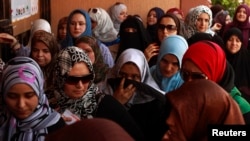TRIPOLI —
Sexual harassment of women is increasing in Libya and women complain that combined with the general lawlessness in the country their daily lives are becoming more of an ordeal and perilous.
It was bad under former Libyan strongman Moammar Gadhafi with men jostling, groping and pestering women in shops, universities and offices and demanding sex but since his ouster two years ago harassment has worsened, say activists and ordinary women.
British expatriate Anne has lived in Libya since 1965. VOA is using only first names as activists fear being targeted.
“It is worse now. When I first came over there was very little harassment of women. In general, the youngsters were very respectful and friendly," said Anne.
The Gadhafi family and their top officials were notorious for abducting women, sometimes spotting them at hair salons or shops. Women would be summoned from their homes after they had been noticed at social events, according to a recently published book Gaddafi's Harem by Le Monde journalist Annick Cojean.
That behavior spread through society, convincing men beyond the power circles that women were fair game, says Nisreen.
“The Gadhafi time there was a lot of sexual harassment and the generations have now grown up with that,” she added.
She says that post-revolution sexual harassment in Libya’s capital and the bigger cities has increased and is now at a different level, with lawlessness making the country more dangerous.
Going out alone or even with female friends risks verbal and sometimes physical abuse, she says. Even shopping has become an ordeal.
“You have all these youngsters who are high on drugs and drunk and who are going around and when they see someone they like or whatever and they start harassing her," said Nisreen.
Libya isn’t the only Middle East country to be experiencing a post-Arab spring explosion of sexual harassment.
In May the United Nations Entity for Gender Equality reported that 99.3 percent of Egyptian women have experienced some form of sexual harassment or violence. Nearly 50 percent of women reported more harassment after the revolution ousting ex-president Hosni Mubarak.
Without a functioning police force there are no statistics available to know how frequent the problem is in the Middle East.
But activists in Libya say it is pervasive and that women are afraid to report harassment fearing they will be harassed by police when they do.
Leila, another activist, says many professional women try to find work they can do from home. She thinks twice about running errands.
“I can’t even walk to the next-door grocery store. I have to take the car,” she said.
Angry about the harassment, activists have followed an example set in Egypt and launched a “Don’t Harass Me” website to record incidents and to try to prod Libyan authorities to act.
It was bad under former Libyan strongman Moammar Gadhafi with men jostling, groping and pestering women in shops, universities and offices and demanding sex but since his ouster two years ago harassment has worsened, say activists and ordinary women.
British expatriate Anne has lived in Libya since 1965. VOA is using only first names as activists fear being targeted.
“It is worse now. When I first came over there was very little harassment of women. In general, the youngsters were very respectful and friendly," said Anne.
The Gadhafi family and their top officials were notorious for abducting women, sometimes spotting them at hair salons or shops. Women would be summoned from their homes after they had been noticed at social events, according to a recently published book Gaddafi's Harem by Le Monde journalist Annick Cojean.
That behavior spread through society, convincing men beyond the power circles that women were fair game, says Nisreen.
“The Gadhafi time there was a lot of sexual harassment and the generations have now grown up with that,” she added.
She says that post-revolution sexual harassment in Libya’s capital and the bigger cities has increased and is now at a different level, with lawlessness making the country more dangerous.
Going out alone or even with female friends risks verbal and sometimes physical abuse, she says. Even shopping has become an ordeal.
“You have all these youngsters who are high on drugs and drunk and who are going around and when they see someone they like or whatever and they start harassing her," said Nisreen.
Libya isn’t the only Middle East country to be experiencing a post-Arab spring explosion of sexual harassment.
In May the United Nations Entity for Gender Equality reported that 99.3 percent of Egyptian women have experienced some form of sexual harassment or violence. Nearly 50 percent of women reported more harassment after the revolution ousting ex-president Hosni Mubarak.
Without a functioning police force there are no statistics available to know how frequent the problem is in the Middle East.
But activists in Libya say it is pervasive and that women are afraid to report harassment fearing they will be harassed by police when they do.
Leila, another activist, says many professional women try to find work they can do from home. She thinks twice about running errands.
“I can’t even walk to the next-door grocery store. I have to take the car,” she said.
Angry about the harassment, activists have followed an example set in Egypt and launched a “Don’t Harass Me” website to record incidents and to try to prod Libyan authorities to act.




